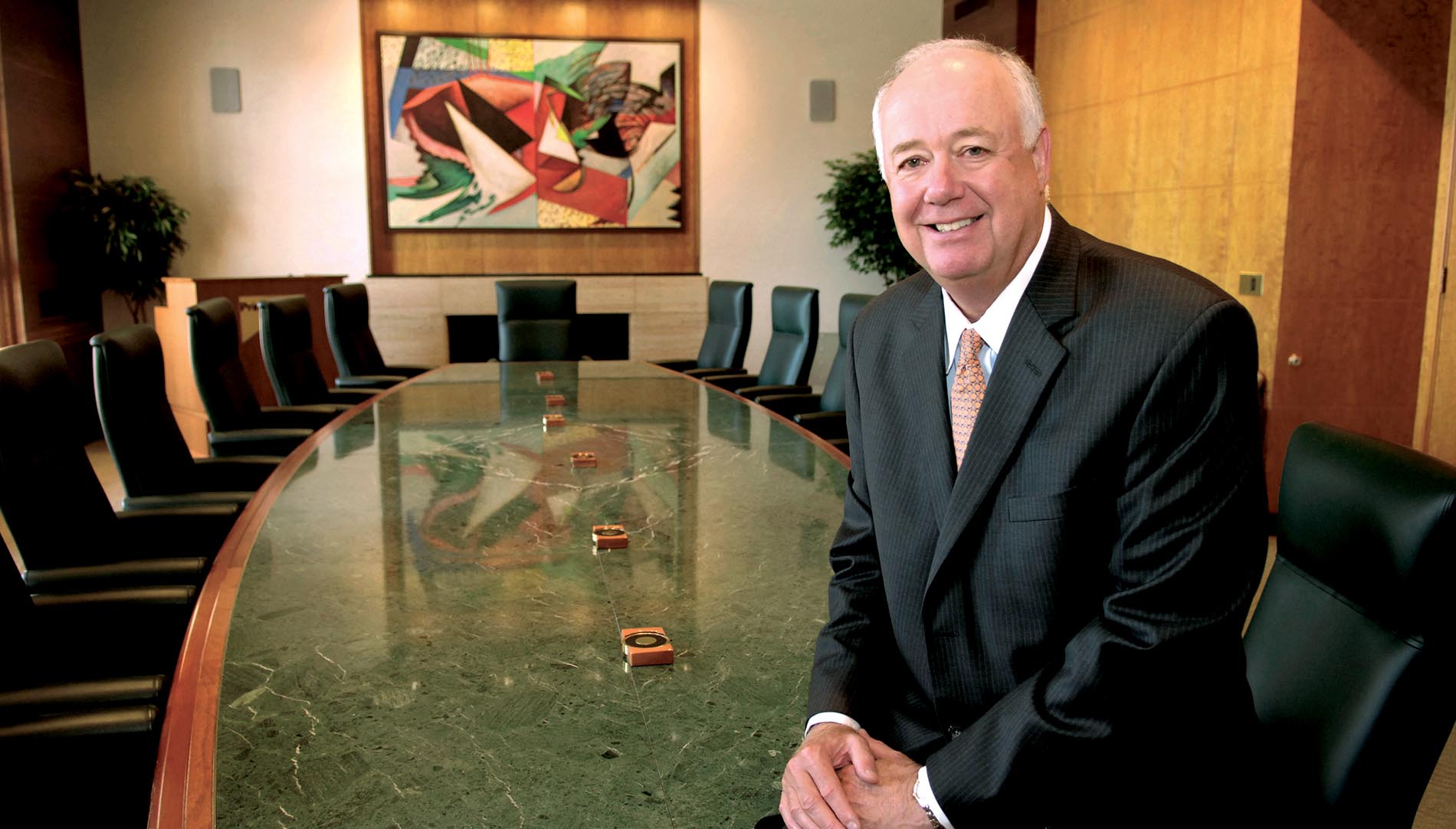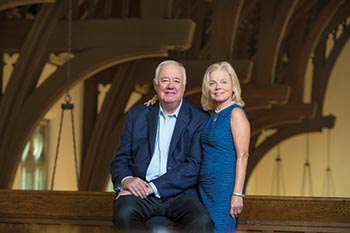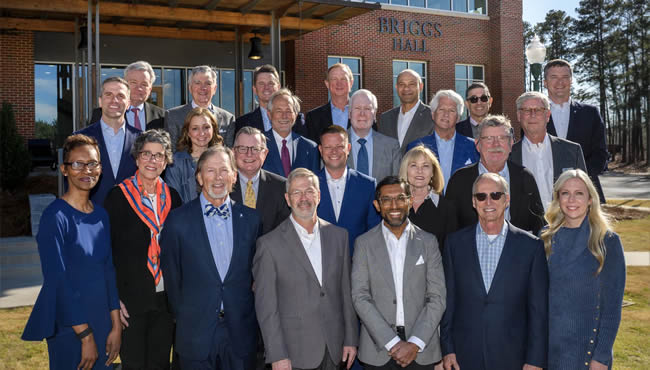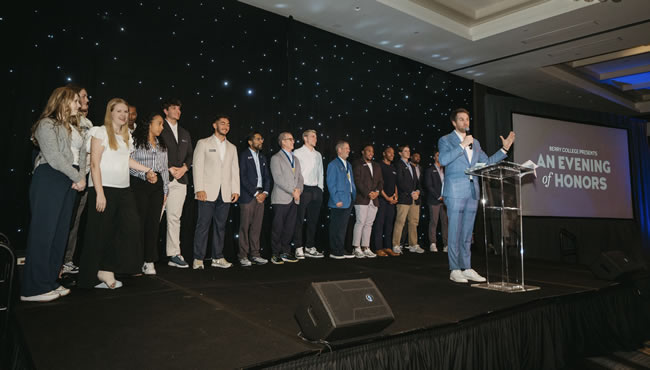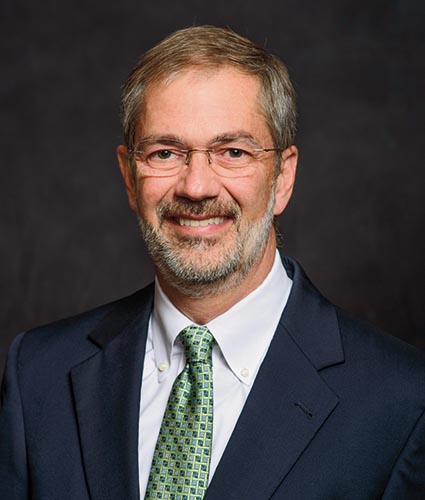
Dr. Stephen Briggs
Berry was forged in the fires of adversity. When Martha Berry deeded over her land inheritance to build a residential school for boys from destitute families, her likelihood of success was near zero. Seven years later, when her trustees sensibly voted down her request to add a school for girls to her struggling endeavor, she proceeded anyway.
Martha embraced adversity in a way that transcended her privileged upbringing. Sunday visits with her father to rural homesteads and a summer spent with a friend exploring isolated mountain hamlets awakened her to the harsh reality of generational poverty and aroused in her a sense of obligation and calling. Her passion inspired many others to join her efforts, and together they changed the life trajectory of thousands of young people.
Martha’s primary assets were grit and a determined faith, and her tenacity came to define the “Berry spirit.”
The spirit lives on
The life of our late Board of Trustees Chair J. Barry Griswell (71C) also was forged in the fires of adversity, and Martha’s school helped alter his trajectory. In fact, on more than one occasion, I heard him say he was sure that Martha Berry had created Berry College just for him. His story certainly epitomizes the spirit of Berry and the generosity of our founder.
Although he grew up in urban Atlanta rather than rural Georgia, Barry came from a broken family. His mother worked multiple jobs to make ends meet. By his teenage years, the family had moved 16 times in 16 years because it was perpetually short of money. Barry started working at a young age to help with expenses.
One of Barry’s jobs in high school was loading trucks at a trucking company. As a part-time worker, he was part of a group that would be called in during especially busy times. These occasions paid extremely well, so workers would vie for these opportunities. To get picked often, workers had to accept the work whenever called. Barry also figured out that the best way to stay at the top of the list was to do whatever was asked and then some. That might mean staying late to finish a job, volunteering for an especially thankless task or simply having the best attitude on a hot day.
It took a while for Barry to articulate the principle of “and then some” that he wrote about in his book with Bob Jennings, The Adversity Paradox, but it is a mindset he learned to apply in many avenues of life. He credited the principle as the best means to personal and professional success, as a defining feature of one’s character. In Barry’s view, its value as an overarching attitude becomes even more apparent when confronted with adversity, whether that be a personal failure, health crisis, unexpected calamity or natural disaster. As Barry wrote in his book, “No matter how difficult the circumstances, relying on and harnessing the power of ‘and then some’ ensures that you’re never helpless in the face of adversity.”
He elaborated that there is more to professional success than hard work and an optimistic attitude. Blessed with height at 6 feet 9 inches, Barry enjoyed considerable success as a basketball player in high school and earned a scholarship to Berry. But by his own account, he was less naturally gifted and motivated when it came to learning. He struggled and drifted in college. Then, in his sophomore year, his girlfriend and eventual wife, Michele Irwin Griswell (70C), encouraged him to take a course with her in economics. Dr. Sam Spector brought the material to life, and Barry was hooked. He started down a path of self-evaluation that embraced misfortunes and mistakes as opportunities for learning and disciplined self-improvement.
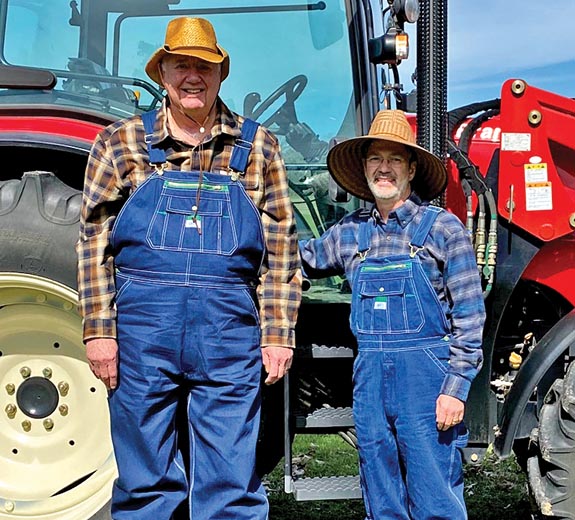
“He thought nothing of dancing on stage, dying his hair green or dressing up as a hayseed farmer if it helped raise funds for a worthy cause.”
It was an emerging inquisitiveness and thirst to learn that propelled Barry to remarkable heights in the business world. After earning an MBA from Stetson University in Florida, he worked for MetLife Marketing, eventually becoming CEO. In 1988, Barry accepted a position with The Principal Financial Group in Des Moines, Iowa, and within 10 years was named president and, subsequently, CEO and chairman of the board. Before retiring in 2010, Barry guided the company through the uncertainty of going public in the aftermath of the 9/11 crisis and calmly led it through the economic upheaval of 2008-09.
As a business icon, Barry moved gracefully in the highest echelons of society. His professional accomplishments were recognized with numerous awards. Perhaps most noteworthy was the 2003 Horatio Alger Award, which honors individuals who have achieved exceptional success while overcoming difficult backgrounds. Not surprisingly, given his leadership skills and business acumen, Barry was a sought-after trustee of major charitable organizations such as Boys and Girls Clubs of America and Scholarship America.
Not to be served, but to serve
The real measure of Barry’s character, however, surfaced in out-of-the-way places. He had eyes for overlooked individuals who needed a kind hand to help them to their feet. He would hear the story of a student who was struggling and discreetly open his checkbook. He was drawn especially to the needs of disadvantaged children, asking quietly as to who might need clothes, shoes or a winter coat.
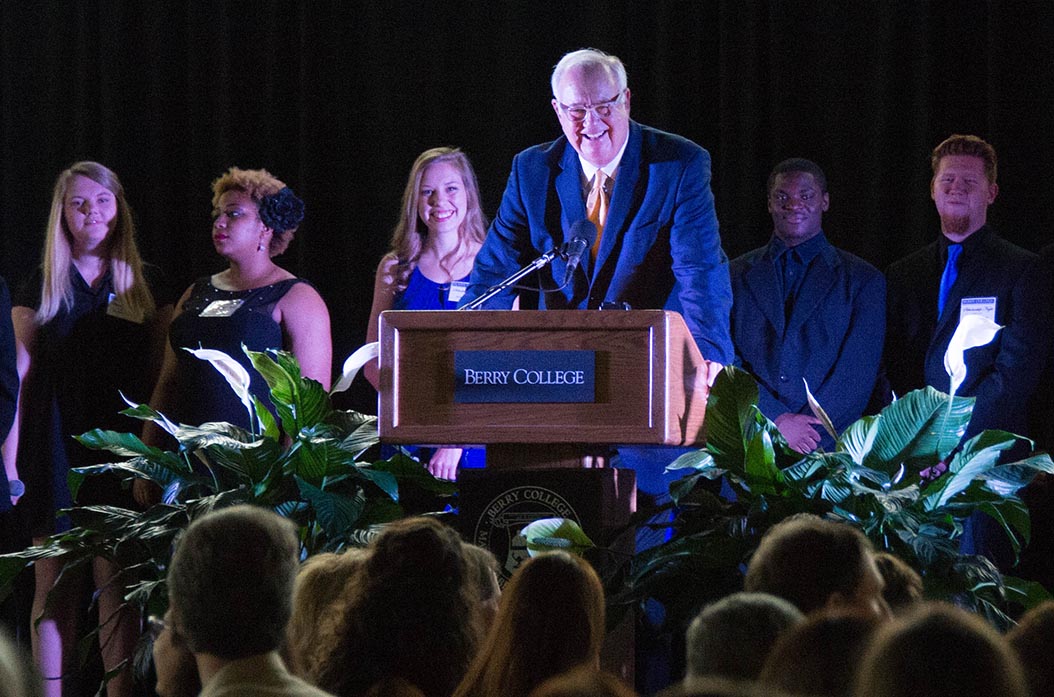
Griswell addressing students and other guests at Berry’s annual Scholarship Night celebration
Together, Barry and Michele were willing to take on the hardest challenges. For more than a decade, they joined with a group of church friends to understand and invest in the social and economic needs of the Crow Creek people of Buffalo County, South Dakota. Like Martha Berry in the Northwest Georgia mountains a century ago, they visited the isolated homesteads of the reservation and provided sustained help to one of the poorest counties in the nation. On one such trip, Barry visited an older Native American woman, helping to evaluate the serious mold conditions and jury-rigged sewage line in her home. Over a meal, Barry talked with the woman and, as a friend described, treated her with the same respect and interest as he would a business peer.
If we are willing
With the odds stacked heavily against him from early on, Barry easily could have conceded to bitterness and low expectations. As he put it, “One of the negative consequences of an upbringing like mine is that I was left with a feeling of inferiority – and that feeling was hard to shake.” He sometimes responded roughly and made mistakes, but then chose to confront the hard truth of his life and make lasting changes. According to Barry, “I worked extra hard to compensate for any deficiencies, imagined or real. … Eventually success breeds success, and your mind starts to accept it.”
He embraced adversity as his ally, and paradoxically, it strengthened him and became the wellspring of his generous spirit. Barry and Michele gave freely to numerous causes in the Des Moines community where they lived for many years and contributed broadly elsewhere as well. They have been equally generous here at Berry, as so many of our students and alumni know personally.
Barry loved life. He was bigger than life in many ways. He had a playful sense of humor and his presence filled a room. He used his influence, assets and sheer force of presence to create opportunities for others. He thought nothing of dancing on stage, dying his hair green or dressing up as a hayseed farmer if it helped raise funds for a worthy cause. And he was vulnerable enough to share stories of his own failings to show others how they too might break free from the constraints of a harsh and harmful background.
Barry would want us to remember that it is vital to know who we are at a fundamental level – that we reflect on the source of our purpose and faith – so that we can pursue valiantly what matters most. Adversity is a profound teacher: It opens our eyes, softens our heart and emboldens our resolve, if only we are willing.
A leader and a friend:
Remembering J. Barry Griswell
Husband, father, teammate, friend. J. Barry Griswell (71C) was many things to those who held him dear, but to his alma mater, he was most of all a leader whose legacy burns brightly in the lives of the countless students he supported over time and the many opportunities he helped make possible.
Griswell died unexpectedly June 5, bringing to a close 17 years of unwavering service to the Berry College Board of Trustees, the last four as chair. News of his death sparked an outpouring of love and appreciation from alumni and friends who were quick to acknowledge his influence.
He was a champion of Berry and one of its most accomplished alumni, reaching the rarified air of the Fortune 500 boardroom as CEO and chair of Principal Financial Group.
His Berry legacy spans half a century, ranging from his days as a basketball standout to his years on the Board of Trustees. His impact was personal and profound, encompassing the students in whom he invested as a donor and mentor as well as the institutional progress he helped to bring about. Both are evident in the now completed LifeReady Campaign, which he supported generously and led, co-chairing with trustee and friend Randy Berry.
“Barry was an ideal board chair during our successful capital campaign and in the period of crisis that emerged last spring due to COVID-19 and the nation’s racial unrest,” said Berry President Steve Briggs. “Problems of this magnitude brought out the best in him. He was a wise leader attuned to matters of social justice. We miss him greatly.”
Among Griswell’s many distinctions were the Horatio Alger Award, the Berry Alumni Association’s Distinguished Achievement Award, and induction into the Boys and Girls Clubs Alumni Hall of Fame.
Survivors include devoted wife Michele Irwin Griswell (70C), a loving family and countless friends who will forever cherish memories of the man one former scholarship recipient described as “friendly, personable, funny and inspirational.”
